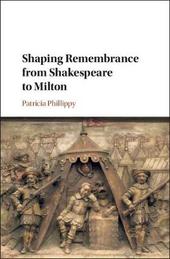
|
Shaping Remembrance from Shakespeare to Milton
Hardback
Main Details
Description
Whether situated in churches or circulating in more flexible, mobile works - manuscript or printed texts, jewels or rosaries, personal bequests or antique 'rarities' - monuments were ubiquitous in post-Reformation England. In this period of religious change, the unsettled meanings of sacred sites and artifacts encouraged a new conception of remembrance and, with it, changed relationships between devotional and secular writings, arts, and identities. Beginning in the parish church, Shaping Remembrance from Shakespeare to Milton moves beyond that space to see remembrance as shaping dynamic systems within which early modern men and women experienced loss and recollection. Removing monuments from parochial or antiquarian concerns, this study re-imagines them as pervasively involved with other commemorative works, not least the writings of our most canonical authors. These far-reaching, flexible chapters combine three critical strands - religion, materiality, and gender - to describe the arts of remembrance as material and textual remains of living webs of connection in which creators and creations are mutually involved.
Author Biography
Patricia Phillippy is Professor of English Literature at Kingston University, London. She has published widely in early modern literature and culture, with a special focus on women's writing. Her books include Women, Death and Literature in Post-Reformation England (Cambridge, 2002), and Painting Women: Cosmetics, Canvases, and Early Modern Culture (2006). She has edited the writings of Elizabeth Cooke Hoby Russell as The Writings of An English Sappho (2011), and A History of Early Modern Women's Writing (Cambridge, 2018).
Reviews'... the book ... offers an impressive if impressionistic account of the unwieldy culture of commemoration in early modern England. In this work, we have a series of leitmotifs - mourning, loss, collection, remembrance, forgetting, curation - that echo one another in frequently surprising ways as they are juxtaposed, ultimately providing an important contribution to the study of a fraught memorial culture in the period.' Andrew Griffin, Early Modern Literary Studies 'Phillippy's painstaking research and close readings unlock the play's cabinet of wonders, 'a woman's wondrous work of a different order' , for scholars of early modern literature, devotional culture, drama, and, above all, memory.' William E. Engel, Renaissance Quarterly 'Compellingly written, and bringing together an unusual and rich collection of texts, artefacts, and practices with a methodology that generates fresh insights into post-Reformation literary and memory culture ... This is an important addition to what is at the moment one of the most vibrant fields in early modern studies.' Isabel Karremann, Modern Language Review
|